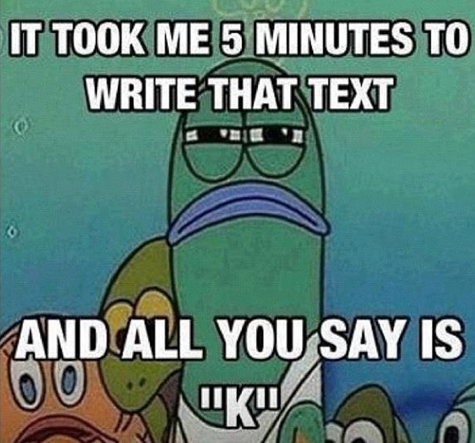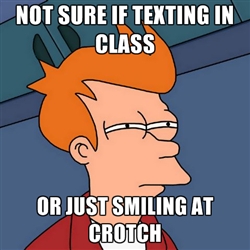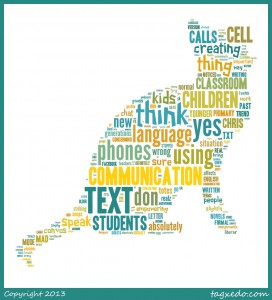
Summary:
“Instant Messaging and the Future of Language” by Naomi S. Baron
This article illustrates the notion of whether or not computer-mediated communication (CMC) is affecting the use of standard English among the young generation. The author demonstrates how the use of standard English has evolved through the Middle Ages and the Renaissance to the modern days. The author also conducted a study at American University in Washington, D.C., which investigated the use of instant messaging via America Online Instant Messenger (AIM) among undergraduate students. The research suggested that “IM conversations serve largely pragmatic information-sharing and social-communication functions rather than providing contexts for establishing or maintaining group identity” (30). The author suggests that parents and educators play a significant role in ensuring the use of formal English among adolescents and that IM is unlikely to have any profound role in changing the writing standards as long as the society does not accept this form of writing as the new standard.
“Txting: the end of civilization (again)?” by Victoria Carrington
This article begins with the author’s recent interview on an Australian radio channel regarding an essay that was fully written in text-language, submitted by a 13-year-old Scottish schoolgirl. The author was asked to discuss the issue of the “legitimacy” (or not) of txt as a form of text. Consequently, the author uses discourse analysis to analyze the initial article and another article regarding texting that was published the next day. The author finds that the articles contained fearful language regarding texting, which she described as a “rhetoric of crisis” (171). The author then illustrates how teachers play an important role in keeping this “correct” version of English and that teachers “are increasingly monitored and controlled” to fit this role of guarding the use of Standard English among teenagers (169, 170). In her conclusion, she proposes that txt should not be dismissed; it is one of many texts that students should become familiar with and fluent in.
Our Standpoint:
Is texting really a threat?
-
No, texting is not a threat to the English language or to our students’ literacy.
-
Text language is just another register that students learn to use in the appropriate setting.
-
There are many different types of literacy, text literacy is one of them. Students need to be multiliterate.
-
Students should be learning and using forms of communication that are relevant to today’s technologies and ways of interacting.
-
There are many useful web tools that facilitate teacher-student discussion through texting, in which even shy students feel confident participating.
Connecting texting to Language Arts:
-
Writing dialogue through texts in creative writing:
How to incorporate text-messaging into narratives? Has anyone read any new novels that incorporate text-messaging in the story? Writers are having interesting conversations online about how to represent text-messaging in their novels and short stories.
-
There is also the growing popularity of the “cell phone” novel genre.
Discussion Questions:
- What are your thoughts towards students using texting as a form of communication with the teacher? Have you had any experience in this context?
- Is using text-language becoming a more dominant way of how children communicate these days? Do you think this will affect their use of formal language?
- Do you think teachers are the “gatekeepers” of language? Why might they be perceived this way?
- Can you think of some other ways that texting or text-language could be used in the classroom?
Activity:
- Use discussion question #2 as an example on Poll Everywhere and have everyone text in their answers.
- Transfer responses to Tagxedo.
Our result: Communication Cat 🙂
Thanks for your participation!
References:
Baron, N. S. (2005). Instant messaging and the future of language. communications of the ACM, 48(7), 29-31.
Carrington, V. (2005). Txting: The end of civilization (again)?. Cambridge Journal of Education, 35(2), 161-175.

– Christina Lee, Melanie McKenna, Dayonne Wegner, Sarah Wu

5 replies on “Texting and the Future of Language”
Cell phones are everywhere. People all over are cancelling landlines and opting to keep just their little mobile devices. Texting has become one of the most common forms of digital communication, and it is hard to argue that as a negative thing when I myself am so often dependent on text messaging. It lets me talk to my sister across the country, friends scattered all over the world, my colleagues, and people I plan on meeting up with later in the day all at the same time, and at an affordable price. It is convenient and helpful and has certainly changed how we talk to one another. I think that the group presenting tomorrow is right on when they suggest that texting language is simply another register that students (and adults) need to learn. It is not necessarily going to ‘destroy’ the English language, but is another part of the English language that can be embraced and distinct. What I think is maybe the most important comment in “Instant messaging and the future of language” is when Baron writes that about knowing “the purpose of the communiqué (a well-crafted email message applying for a job vs. a hasty blitz mail arranging to meet at the library at 10.)” This illustrates the idea that we as teachers need to make sure students are aware of when and where they are using different forms of language. It is acceptable for me to say “meet ya in 10” to a friend as I’m rushing out the door to meet her at a coffee shop because I know that I would never use ‘ya’ in a more formal piece of writing. My dad texts me all the time, just because he wants to say hello, but his fingers are big and his eyes aren’t as great as they used to be, so texting takes him forever if he tries to write full, proper sentences. As a result, I get a lot of “hi ell, how r u? miss u”s from my well educated father. It is easier for him that way! I think it is a similar case for those of us who are good at using phones; sometimes abbreviations or a forgotten capitalization is simply quicker, and something that we often opt for in our busy days. I don’t think that this is a terrible thing either, as the article notes; teenagers often grow out of their use of IM lingo. Further, with the advancement of technology, smart phones are auto-correcting and fixing a lot of the grammar mishaps in text messages automatically. As long as students know the difference between such informal and formal written language, there is no need to understand texting as a threat to the language.
Ellis
Here are the links I mentioned in class about the classic novels/plays moving into text speak:
http://www.teachers.yale.edu/curriculum/viewer/initiative_09.03.05_u — From Yale
http://www.nbcnews.com/id/10084329/ns/technology_and_science-wireless/t/b-ntb-shakespeare-gets-texting-treatment/#.UeRAO1MpcRI –NBC News Article
Here’s the link to the “Texts From” series on The Hairpin: http://thehairpin.com/tag/texts-from/
There’s some pretty bang-on characterization in some of the text conversations. I especially like the mom in Pride and Prejudice and Mr. Rochester in Jane Eyre (he types entirely in ALL CAPS!!!).
Great job guys – excellent presentation and interesting discussion that followed it!
I think it’s fascinating to think about the evolution of language and how that’s tied to the evolution of technology. In Naomi Baron’s article, “Instant Messaging and the Future of Language” she talks about how standard English has evolved and is still within the process of evolving. If the advent of the printing press ushers in a change in spelling and in the standardization of the written language, and cell phone use and texting helps to initiate a new register in English, what might language look like when texting is voice operated only (or thought operated – in our dystopian rendition of the future)? I’m curious as to how language will continue to evolve as technology moves away from requiring the user to write into a voice-activated technology where the user has no access to the written word.
Using cell phones in the classroom as a tool for learning is something I’d like to try in a classroom setting. I still think that it can be problematic when certain students don’t have a cell phone or a handful of students have the newest versions of cell phones. Owning expensive technology may become a type of status symbol rather than a tool to engage the lesson. Students already have many things to display as status symbols – do they really need to bring these into the classroom to display as status symbols as well?
Considering the idea that English language teachers may be the “gatekeepers” of English – initially I thought that this seemed like a ridiculous proposition and that language has the ability to evolve and who are we as English teacher to prevent this evolution? While, at the same time it is our role as English teachers to teach the prescriptive rules of grammar so that students can engage with and create texts that are written in a standardized English; without this knowledge, they won’t necessarily have the tools to move forward in their education.
I thought it was really interesting what Melanie said about her Cree friends and their using text language that mimics the English dialect they speak. This made me think about friends of mine whose first language isn’t necessarily English and the way they adapt their first language into the way they speak (and also into their texting practices). It makes sense to want to adapt the way you speak into the way you text – texting is a social medium and is not the same formal practice as using standard English in a classroom or a formal writing setting. It seems unfair, as Ellis makes note of in her comment above, to suggest that when people are using texting which incorporates spoken language, they are incapable of applying formal English when the setting demands it, and I don’t think this is necessarily a valid argument for excluding texting as a means of communicating and expressing oneself (this is different when we consider English Language Learners, though!).
Works Cited:
Baron, N. S. (2005). Instant messaging and the future of language. communications of the ACM, 48(7), 29-31.
Dear Christina, Cristina, Sarah, Dayonne and Melanie,
Thanks very much for your presentation on computer-mediated communication. I found your summary of the articles useful and felt your perspective on the topic was balanced. I appreciated your personal examples of the use of IM and txting in and outside of formal school settings (although the one school example Melanie mentioned was disheartening). I also appreciated the perspective the linguists in the group brought to the discussion in terms of how we define “language” and what counts as “valid” usage.
I thought the exercise you suggested — having students think of how they might frame txting in creative writing — was particularly useful. Evidently there is a need to contemplate best ways of representing these communication forms in literary art given that formal practices for representing dialogue are insufficient. Your remarks reminded me of the early (in terms of the Internet) film that took on this challenge in the context of representing email communication on screen: You’ve Got Mail.
You led discussion very well, and many rich conversational threads emerged. As you may have discerned, I am particularly interested in the resurgence of writing associated with contemporary communication technologies and the seeming turn away from orality (even though many of the emerging methods of written communication have an oral or conversational inflection).
Overall, this is a rich topic and you did a very good job of introducing it. Thanks for your contribution.
Best regards,
Teresa